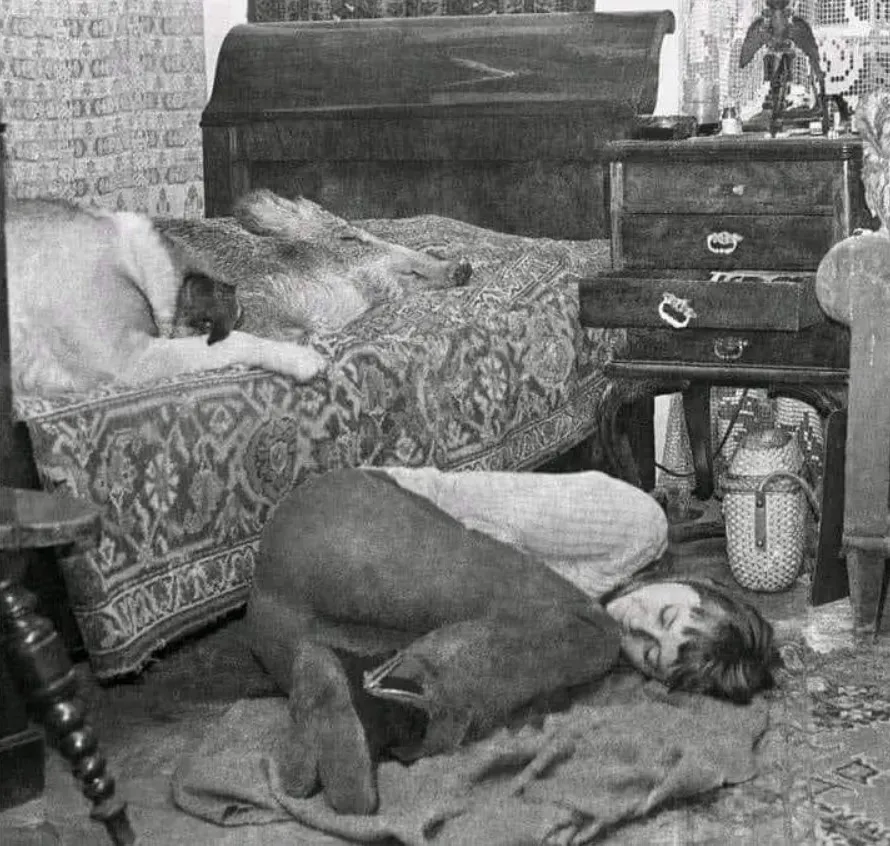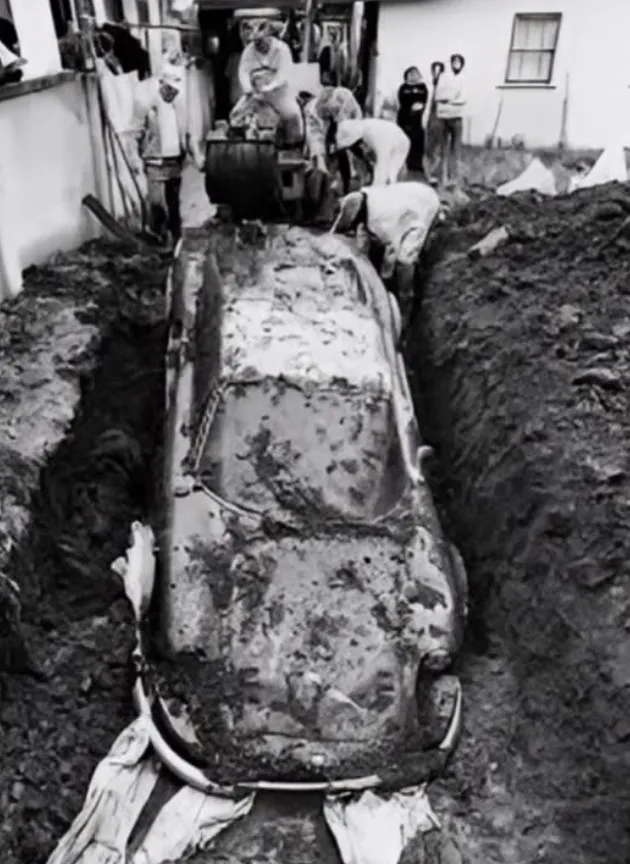The Silent Guardian of the Jungle 819

The jungle of Borneo has always carried an air of mystery. It is a place where life thrives in layers—where the canopy forms a roof so thick that the sunlight filters down in scattered beams, where insects hum in endless symphonies, and where every shadow might conceal something wondrous or dangerous. Into this setting, a woman set out on a challenge of endurance: twenty days alone, with nothing but her skills, her wits, and her camera to record the story. She thought she would be the sole narrator of her journey. But the jungle had another character waiting in the wings—an unexpected companion whose presence she would not realize until it was nearly over.
At first, her days were predictable in their difficulty. She foraged for what food she could find, collected water where the forest offered it, and built her shelters from branches and leaves. Each night, when the sounds of the forest swelled, she huddled beneath her roof of sticks and vines, speaking softly into her camera about her exhaustion. She thought the footage would show only her struggles—the restless sleep, the anxiety of being alone in a place so vast, the strange noises that never ceased. But when she finally reviewed the tapes, she discovered a secret hidden in those long nights.
One morning she had woken with her hair brushed to one side, lying neatly as if smoothed by unseen hands. She dismissed it, telling herself it was nothing but the shifting of her head against the straw. But the following morning, the same thing happened again—this time on the opposite side. The neatness of it unsettled her. Out here, nothing happened by accident. Curiosity took hold, and she turned to the camera that had kept watch while she slept.
The footage stunned her. Out of the dark, a figure appeared: an orangutan, moving with deliberate slowness, as though it already knew the boundaries of her fragile shelter. Its immense body should have made noise, should have woken her, but somehow it was silent. The ape lowered itself beside her, and with careful fingers, it brushed her hair away from her face. The gesture was startlingly human. It lingered there, stroking gently, before settling nearby. It did not leave until just before sunrise, slipping away like a shadow.
When she checked the rest of her recordings, she saw that this had happened not once, but again and again. Night after night, the orangutan returned. Each time, it smoothed her hair, as though tucking her in, before sitting in quiet vigil until dawn. It was not a trick of chance, nor a single curiosity. It was a ritual, repeated faithfully under the cover of darkness.
Scientists who later reviewed the video offered an explanation: the orangutan had likely perceived her as vulnerable, perhaps even as an infant of its own kind. Orangutans are known for their deep maternal instincts and for their gentleness in caring for their young. To this one, the woman may have seemed helpless—an orphan in need of comfort. The act of smoothing her hair was grooming, an instinctive form of care. Sitting watch through the night was protection. In its eyes, she was family.
The woman’s survival challenge had been framed as a test of endurance, a contest between her and the wild. Yet the reality captured on her footage revealed something far richer. The jungle was not only a place of struggle; it was a place of unexpected companionship. She had not been proving her strength alone. She had been sharing her nights with a guardian she never asked for and never noticed.

There is something profoundly moving in the image of an orangutan watching over a sleeping human. Orangutans are creatures of immense power, capable of feats of strength that could shatter branches thicker than a man’s arm. Yet in those recordings, the ape’s touch was as soft as a lullaby. It chose not to harm, not even to disturb, but to comfort. In that choice lies a lesson humans often forget: survival does not always come from dominance. Sometimes it comes from compassion.
When the survivalist finally learned the truth, she described her reaction simply: awe. She had braced herself for danger from predators, from venomous creatures, from storms and hunger. She had expected loneliness to be her greatest test. But she had never expected this—an ally in the dark, a guardian who asked for nothing and left without a trace. “I thought I was alone out there,” she admitted. “But I wasn’t. Every night, he was with me. He didn’t just watch me—he cared for me.”
Her story spread far beyond the rainforest, not just as an anecdote of survival, but as a fable about connection. It reminds us that humans and animals are not as far apart as we often believe. Orangutans share ninety-seven percent of our DNA. They feel emotions, form bonds, and act with empathy. And sometimes, as in this case, they extend that empathy across the boundary of species.
The lesson of the orangutan’s vigil is larger than one woman’s survival. It asks us to rethink the way we view the natural world. Too often we cast it as hostile, a place to conquer or endure. But here, in the stillness of night, the jungle revealed another truth: it can also shelter, embrace, and protect.
The orangutan’s gentle care also underscores what is at stake as these creatures vanish. Orangutans are critically endangered, their habitats shrinking every year under the weight of deforestation and human expansion. If we lose them, we lose more than a species—we lose living mirrors of empathy, reminders of what it means to see another’s vulnerability and respond with kindness.

In the end, the image that lingers is simple yet unforgettable: a massive ape, sitting beside a sleeping woman, brushing her hair with delicate hands. It is a scene that blurs the lines between fable and fact, between human and animal, between survival and love.
She came to the jungle to prove her endurance. Instead, the jungle proved something to her: that compassion exists where you least expect it, that strength can be soft, and that sometimes, in the deepest dark, you are watched over by a silent guardian you never knew was there.
And so the story of the orangutan and the woman is more than survival. It is a reminder. A reminder that the forest is alive not only with danger, but with care. That progress should never blind us to empathy. And that the bonds of life—between human and animal, between the strong and the vulnerable—run deeper than we dare to believe.
Because in the jungle of Borneo, beneath the endless canopy, one woman slept alone each night. Or so she thought. In truth, she was never alone at all.
A Stranger, a Stuffed Dog, and a Lesson in Kindness You Won’t Forget 129


It was a simple trip to the store—one I’d made countless times before—but that night, it turned into something unforgettable. I went with my 13-year-old stepdaughter and my nearly two-year-old toddler, expecting nothing more than the usual errands. Life with kids is busy enough, and store runs are rarely uneventful. But sometimes, the smallest moments leave the biggest impressions.
As we waited in line, my toddler’s attention was fixed on a stuffed dog in the aisle. Big eyes, tiny hands, and that uncontainable fascination toddlers have—it was impossible to ignore. I glanced down at her, smiling, and then back up, only to notice the man standing ahead of us in line. He was older, quiet, buying only a single ice cream. There was something gentle in the way he observed the world around him.
Then he spoke. “What are you looking at?” he asked, his voice warm, genuine.
My toddler pointed without hesitation. He leaned down, picked up the plush toy, and handed it to her. My stomach dropped.
We live on a single income, carefully budgeting every expense. An unplanned purchase like this wasn’t something we could easily justify. I braced myself, expecting to have to tell her it wasn’t possible, to take it back and face the inevitable tears, the crushed little heart. But the man smiled.
“I’ll buy it for her,” he said.
I froze. The shock, the gratitude, and then a sudden surge of guilt all collided inside me. Why did I hesitate? Because part of me feared the stranger’s motives. Because part of me instinctively thought to question every act of kindness. And because—admit it—I live in a world where caution has become reflexive.
But the moment he made my daughter laugh, every doubt melted away. Her small, delighted squeal echoed through the store, and I realized what I had almost overlooked: the power of kindness. That toy wasn’t just a gift. It was a lesson in humanity, generosity, and trust.
My stepdaughter witnessed it all. I tell her constantly that kindness matters, that even small gestures can change someone’s day. But tonight, she saw it firsthand. She watched a stranger connect with someone she loves, someone small, someone full of wonder, and the impact was immediate. When we left the store, she turned to me and said, “Mommy, that man was so sweet!”
The stuffed dog—affectionately dubbed Bacon by her siblings—hasn’t left my toddler’s arms since. Every hug, every toss, every cuddle is a reminder of that brief moment of generosity. I never learned the man’s name, but I took a photo. A simple, silent promise to myself that I would never forget: no act of kindness is ever too small.
And maybe that’s the greatest lesson of all. We live in a world that often trains us to expect the worst: to be suspicious, cautious, and protective. But sometimes, the world surprises you. Sometimes, a stranger can give more than a toy—they can give hope, joy, and a memory that will linger far longer than any purchase receipt.
Tonight, the lesson wasn’t just for my children. It was for me, too. Kindness doesn’t require explanation, motive, or reward. It only requires a willingness to care, to notice, and to act. In a brief, fleeting moment, one man’s choice to be generous reminded us all of something essential: humanity thrives when we lift each other up, even in the smallest ways.
As we walked out of that store, with Bacon clutched tightly in little hands, I realized that perhaps the world doesn’t need grand gestures. It just needs more people willing to hand a stuffed dog to a toddler and smile.






